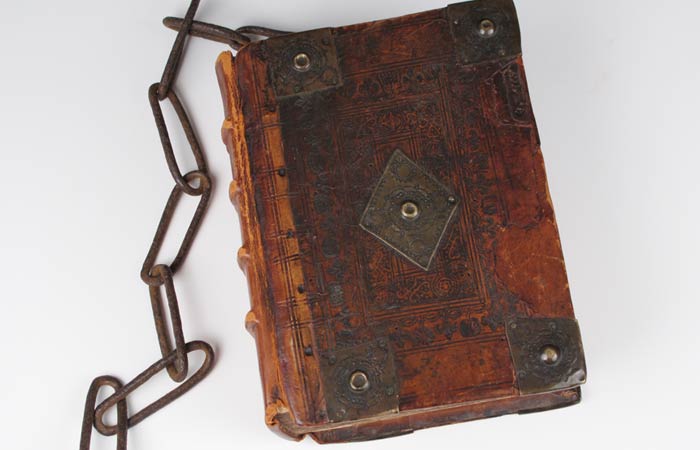Quick Apology: Chained Bibles
In today’s Quick Apology post I wanted to turn to the subject of history…
Objection
When speaking about the Catholic approach to Scripture, some Protestants will make the following accusation:
“The Catholic Church used to chain up Bibles!”
Response
The statement is absolutely true; it was not uncommon prior to the Reformation for Bibles to be chained up. When I am told this in a discussion I concede the point, but I then ask the person speaking if they know why this was done…
It is not uncommon to receive as a response, “They chained them up to stop people reading the Bible!”. While the initial statement was true, this explanation as to why Bibles were chained is completely incorrect. In fact, Bibles were chained for completely the opposite reason. Bibles were chained up so that more people had access to the Scriptures!*
You see, prior to the Fifteen Century and the invention of the movable type printing press, Bibles were hand-written. This was an colossal undertaking and therefore extremely costly. This meant that Bibles were expensive items liable to be stolen by thieves. Therefore, in an attempt to provide people with access to the Scriptures, it was common for a Bible to be made available in or around a church building, but to prevent theft, it was chained to a heavy object. If you had a Bible worth tens of thousands of dollars, would you want to leave it unsecured and unattended in a public building?!
If you visit a post office or a bank, you will often see pens chained to immovable services. Do these institutions chain these pens because they don’t want you to use them? Of course not! They want you to use the pens, but they want to make sure nobody steals them! Why? Because if they are stolen then other people won’t have the opportunity to use the pens. It is the same logic at work concerning the chaining of Bibles.

* It is probably worth pointing out that literacy rates were also extremely low even until the 19th Century. It is for this reason that the most common way of learning the Bible throughout Christian history has been the hearing the Scriptures proclaimed at the Eucharistic liturgy.
I remember learning about chaining books to shelves (it wasn’t just Bibles, since as you point out all books were valued highly at the time) a number of years ago when I read a book about bookshelves.* But I never realized some thought it was to keep people from having access to scripture.
*Yeah, a book about the history of bookshelves exists, and I own it.
Yeah, unfortunately there’s quite an industry for anti-Catholic polemics which is just recycled over and over without any fact checking…
(Anne, there’s a entire-secular historic house near here (the Alice Paul estate) where the only item owned by Ms. Paul herself was a bookcase. I always joke with a graduate school classmate of mine whose job as an intern was being in charge of that bookcase about how to use it to store secondary-source history books about said primary-source bookcase…
Now I need to joke with her about how at least she wasn’t CHAINED to the bookcase!
(she kept giving me a well-deserved stink-eye over my own internship at the time at the local historic naval battleship, although I *did* make the same remarks about dealing with a museum being an artifact full of secondary sources…))
LOL…
Pingback: This Week's Best in Catholic Apologetics | DavidLGray.INFO